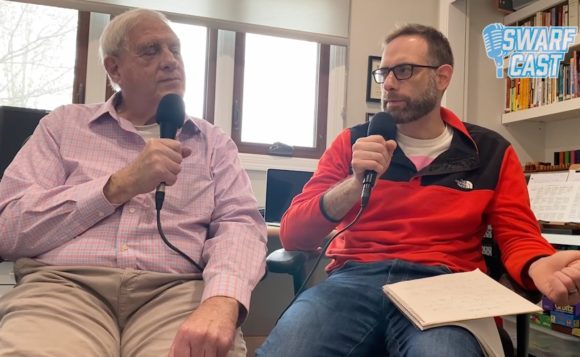Today we’re celebrating the milestone of 150 episodes of Swarfcast. This is actually Episode 155. We just didn’t get around to doing this one until now. I hope you enjoy as we look back at four of our favorite past episodes spanning the last four years. Four years! Not much has happened for me? Besides getting married, surviving a pandemic, and having my first child a month and a half ago.
Follow us on Social and never miss an update!
Facebook: https://lnkd.in/dB_nzFzt
Instagram: https://lnkd.in/dcxjzVyw
Twitter: https://lnkd.in/dDyT-c9h
Making this podcast I’ve been privileged to meet and learn from a ton of interesting people and then share our conversations with the world. When we started the podcast we racked our brain to find some interesting guests. What we quickly discovered was that rather than interviews with famous people or “experts” on manufacturing or business topics, often the interviews our audience liked the most were with owners of machining companies. Every machining company runs differently, and people love to learn how others approach the same type of work they do.
In today’s podcast I inserted some old clips of two past interviews with owners of machining companies. In Episode 63, I interviewed David Wynn, CFO of ABF Engineering, a third generation screw machine shop in South Fulton, Tennessee. Wynn’s business philosophy is to run his machining company as though it were a modern tech company. This is somewhat ironic because at the time of the interview in 2019, more than 50% of the company’s work was produced on ancient Brown and Sharpe screw machines. One of ABFs management strategies that sets itself apart from typical machining companies is its undefined work hours. Its employees have the flexibility to work when they like and choose how many hours they work, as long as they get their work done and do it well as a team.

Another clip I included in today’s podcast comes from Episode 121, Finding Customers Through Great Networking with Jay Sauder. Jay’s company Sauder Machine in Plymouth, Ohio, makes casings for mechanical pocket watches as well as wheel cylinders for horse drawn buggies driven by Amish people. Jay is Mennonite, which has enabled him to develop a customer network of Amish companies. He also has a large customer base of companies not owned by Amish people, but he says all of his customers came to him through word of mouth, as opposed to advertising on the Web or using salespeople.
Over the past four years, I have interviewed several experts on the show who have had a profound effect on my life. One of my all-time favorite interviews was Ep. 80 and 81, with negotiation masters, Chris and Brandon Voss, who wrote the best selling book, Never Split the Difference. Chris is a retired FBI hostage negotiator who adapted his negotiation skills for use in the business world. In the interview we talked about the advantage of having one’s counterpart in a sales negotiation name price first, as opposed to starting a negotiation with a high asking price or extremely low offer. We also discussed why it is best to make the other party in a negotiation say “no” rather than “yes.” Over time, I have incorporated their techniques into my daily personal and professional life. I still sometimes watch video clips from the interview to review some of their brilliant lessons.
Another interview that has had a profound influence in how I approach my life is Episode 123—How to find Serendipity with Christian Busch. Busch is the author of the book, The Serendipity Mindset: the Art and Science of Finding Good Luck. He gives strategies to enable people to “be in the right place at the right time.” One of his techniques to find serendipity in conversations he calls “serendipity hooks.” The concept is to purposefully bring up topics that inspire connections between people.
For example, if someone were to ask me what I did for a living, instead of telling just them I was a used machinery dealer, I could say, “I’m a used machinery dealer, I also have a podcast, and I love salsa dancing.” That response would create three possibilities for interesting conversations, rather than just one that might not lead to talking about anything of substance.
Christian also emphasizes the importance of keeping one’s eyes open for serendipity. If a person believes that important “lucky” things might happen on a given day, there is a better chance they will.
Interviewing all the interesting guests on Swafcast creates a fountain of serendipity that really energizes me. I need that energy because making a podcast is often a grind! Thankfully, I have some good help to make the podcast possible. Ridgely Dunn, our Managing Editor, gets these pesky blogs and podcasts up, takes care of social media, and helps make the whole thing happen. Our editor Patricio Garcia does a good job making me sound a little smoother than I really am on the mic. Obviously, Lloyd is the great Lloyd Graff! He is the creator and nucleus of Today’s Machining World. He is my occasional cohost, mentor, and most importantly my dad.
Much of the podcast-making process is fun, and it fulfills my need for a creative outlet to some extent. Perhaps one day it will be a profitable business. But what really motivates me to make Swarfcast is the propose it gives me. I’m not a heart surgeon helping people cheat death, or a therapist helping someone cope with depression, or a philanthropist working to end world hunger. It’s easy to identify purpose in those occupations. Swafcast is my vehicle to effect a lot of people, to leave my mark on the world, at least just a little. If 500 people listen to it and 1000 people read the summary and they learn something important, or they reflect on a new idea or just have a nice 45 minutes of diversion, I feel purpose.
Questions:
What is one of your favorite episodes of Swarfcast?
Would you like to appear on the show?
Podcast: Play in new window | Download




